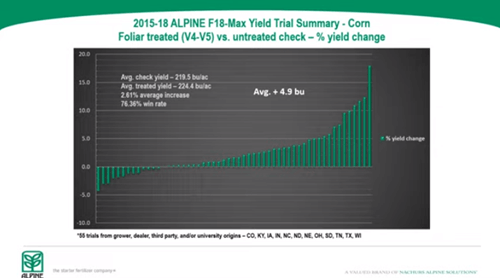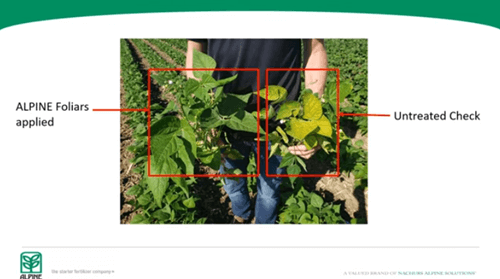APLINE’s new F18 MAX featuring K-Tech potassium launched this season
Ryan Ridley
Farms.com
We caught up with Ken Brett, District Sales Manager at APLINE, at the 2020 Great Ontario Yield Tour Virtual Final Event. Brett presented 'Maximizing Nutrient Efficiency with K-Tech® Potassium Products' on September 3, 2020.
“K-Tech is ALPINE’s exclusive new potassium technology. We’re currently using it in two starter products, ALPINE G241-S and ALPINE HKW6, both in-furrow starters and we also have it in two super foliar products, ALPINE K20-S and ALPINE K24,” explained Brett. “I’m pleased to present two new products in this spectrum, ALPINE F-18 Max, a foliar product, and K19-S, which is a UAN side-dress companion.”
So why the new attention on potassium nutrition?
To answer this, Brett refers to soil test data by A&L Canada Laboratories where it shows declining potash levels year-over-year in the soil.
“This can be attributed to a couple of reasons – the first is less livestock production and manure applications are declining – and also soybeans, corn and wheat are all yielding better for us now and we’re pulling more potassium out of the soil,” he said.
On the foliar side, APLINE’s new F18 MAX featuring K-Tech potassium launched this season with good results on several crops. F18 Max is an 8-4-6 with 1% zinc, 1% manganese, 0.1% boron and 0.05% copper.
“A differentiating factor for ALPINE’s F18 Max is the very strong amount of zinc and manganese. A lot of similar products in this market space are only at 0.05% zinc and manganese, which is 20 times less than F18 Max,” said Brett.
“The potassium is sourced from K-Tech and it also carries organic acids, surfactants and compatibility agents.”
Brett also noted that ALPINE’s F18 Max flows and mixes well with no tank mixing issues in sprayers and is used to both correct efficiencies and get the crop through some of the stressful times they encounter over the course of the growing season.
“We have to change the way we think about nutrient application,” explained Brett. “I think that often post-emerge sprayers are thought of as strictly a crop protection applicator but we must also think of it as a nutrient applicator, outside of UAN solutions.”
Brett urges growers to get a tissue sample taken a few days before you plan your protection application.
“You might be surprised what you find. It could be as simple as a little bit of boron is needed to keep that crop moving on or some other nutrients are starting to go deficient on you as well,” he added.
Since this is the first year that F18 Max has been used in Ontario plots, Brett refers to data from a sister company in the United States where the product has been used for several years, until ALPINE can build up that database in Ontario.

“Across those 55 trials in the U.S. corn belt, F18 Max had a 4.9 average bushel advantage over putting no treatment on, and it did give a response over three quarters of the time at 76 percent,” explained Brett. “Our early indications in Ontario are that it’s giving a nice yield bump.”
Brett also discussed the molecular weight of potassium sources and how it impacts entry into the plant.
“Generally speaking, products with lower molecular weight will gain entry to the plant via cell membranes at a faster rate than those of larger molecular weight origin. Other factors such as polarity, chelation, etc. will also have an effect,” he added.

“A picture is worth a thousand words,” said Brett.
The 2020 Great Ontario Yield Tour Final Event was held online on September 2-3, and featured several presentations from experts, and event hosts and sponsors. Corn and soybean samples were taken by scout on hundreds of farms across Ontario. At the end of the tour, province-wide corn and soybean yield estimates were released, as well as regionalized estimates for south, east, central, and western Ontario. ALPINE’s presentation was given as part of the final event.
Photo: alpinepfl.com
Related Articles
Ont. soybean yield could be record-breaking: https://www.farms.com/ag-industry-news/ont-soybean-yield-could-be-record-breaking-710.aspx
Maximizing corn production profitability: https://www.farms.com/ag-industry-news/maximizing-corn-production-profitability-049.aspx
2020 U.S. & Global Soybean Market Outlook: https://www.farms.com/ag-industry-news/2020-u-s-global-soybean-market-outlook-051.aspx
Do you truly know your harvest loss? https://www.farms.com/ag-industry-news/do-you-truly-know-your-harvest-loss-142.aspx
Closing in on higher yields: https://www.farms.com/ag-industry-news/closing-in-on-higher-yields-239.aspx
How to grow more with less: https://www.farms.com/ag-industry-news/how-to-grow-more-with-less-273.aspx